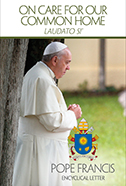What to do? Pope Francis’ tips for helping the environment

Photo Caption: This is the cover of the English edition of Pope Francis’ encyclical on the environment, “Laudato Si’, on Care for Our Common Home.”
By: By Carol Glatz, Catholic News Service
VATICAN CITY (CNS) — Pope Francis’ encyclical “Laudato Si’, on Care for Our Common Home” is a call for global action as well as an appeal for deep inner conversion.
He points to numerous ways world organizations, nations and communities must move forward and the way individuals — believers and people of good will — should see, think, feel and act.
Here are some of the pope’s suggestions, with references in parentheses to their location in the encyclical:
— Do not give in to denial, indifference, resignation, blind confidence in technical solutions. (14, 59)
— Have forthright and honest debates and policies; issues cannot be dealt with once and for all, but will need to be “reframed and enriched again and again” by everyone with plenty of different proposals because there is no one way to solve problems. (16, 60, 185)
— Reduce, reuse, recycle. Preserve resources, use them more efficiently, moderate consumption and limit use of non-renewable resources. (22, 192)
— Slash pollutants and greenhouse gas emissions. Transition to cleaner and renewable energies and replace fossil fuels “without delay.” (26, 165)
— Promote green construction with energy efficient homes and buildings. (26, 180)
— Protect clean, safe drinking water and don’t privatize it with market-based fees for the poor. (27-29, 164)
— Keep oceans and waterways clean and safe from pollutants; use biodegradable detergents at home and business. (30, 174)
— Be aware that synthetic pesticides and herbicides will hurt birds and insects that are helpful for agriculture. (34)
— Leave room for wandering and migrating species by creating “biological corridors;” don’t let dams, highways and construction lead to their extinction. (35)
— Protect biodiversity, especially wild forests, wetlands, coastal areas, mangrove swamps. (39)
— Promote smart growth. Create livable communities with beautiful design and plentiful green spaces for everyone, especially the poor. Tackle noise and “visual pollution,” and save cities’ cultural treasures. Design spaces that help people connect and trust each other. (44-45, 113, 143, 147)
— Put an end to “mental pollution.” Think deeply, live wisely, love generously. (47)
— End the tyranny of the screen, information overload and distractions. Watch out for media-induced melancholy and isolation. Cultivate real relationships with others. (47)
— Get down from the ivory tower and stop the rhetoric. Get to know the poor and suffering; it will wake up a numbed conscience and inspire real action. (49)
— Stop blaming problems on population growth. The real threat is excessive consumerism and waste. (50)
— For genuine change, put the common good first. Special interests manipulate information, offer “superficial rhetoric, sporadic acts of philanthropy and perfunctory expressions of concern.” (54)
— Sweat it out. Increasing use and power of air-conditioning seems “self-destructive.” (55)
— Even if it doesn’t fix the world, beautification and goodwill gestures inspire and remind people that “we were made for love.” (58, 113, 212)
— Get back to nature — “the caress of God” — to recharge. Be more attentive to its beauty and wonder and revisit places that left you with happy memories. (84, 97, 215, 233)
— Be consistent. Pro-life, environmental and social justice movements are all connected. Protecting vulnerable species must include the unborn, endangered animals and the exploited. (91, 120)
— Use technology to solve real problems and serve people, helping them have more dignity, less suffering and healthier lives. (112)
— Believe in a happy future, a better tomorrow. Slow down, recover values and the meaning of life. Putting the brakes on “unrestrained delusions of grandeur” is not a call to go back to the Stone Age. (113-114, 225)
— “Business is a noble vocation.” Create jobs that allow for personal growth, stability, living out one’s values. (124-128)
— Listen to, protect lands of and involve indigenous peoples. The disappearance of cultures is even more serious than losing a species. (145)
— Create neighborhood networks and improvement programs. Create welcoming spaces that help people connect and trust each other. Do something nice for your community. (148-150, 152, 219, 232)
— Make public transportation a priority and a more pleasant experience. (153)
— Provide essential services to rural areas. (154)
— Accept and care for the body God gave you. Value sexual differences and your own gender. (155)
— Join, implement and police global agreements on sustainable development, caring for the ecosystem, limiting greenhouse gases, handling hazardous wastes, ozone protection. Nix the “ploy” of trading carbon credits. (164, 167-171)
— Politicians: don’t be afraid of long-term goals and upsetting people with measures that affect levels of consumption, financial risks. Citizens: put pressure on your representatives. (177-180)
— Less is more. Stop needless consumption. (193, 203, 222, 211)
— Harness purchasing power. Examine what you buy and know that boycotts make a difference. (206)
— Plant a tree. Take mass transit. Car pool. Turn off the lights when you leave the room. Chilly? Wear a sweater. Little things add up. (211)
— Moms and dads: teach kids to use things properly; to respect, take care of others; to ask permission politely; to say, “Thank you;” to control temper; to ask forgiveness; share. (213)
— Find happiness in simple things: get-togethers, helping others, honing a talent, enjoying art and music, praying. (223-224, 226)
— Say grace before meals. (227)
— Love your enemies. (228)
— Practice “the little way” of St. Therese. (230)
— Go to Sunday Mass; receive the sacraments; encounter God in everything; rest on Sundays. (233-237)
— Sing as you go. (244)
— Pray. (246)





